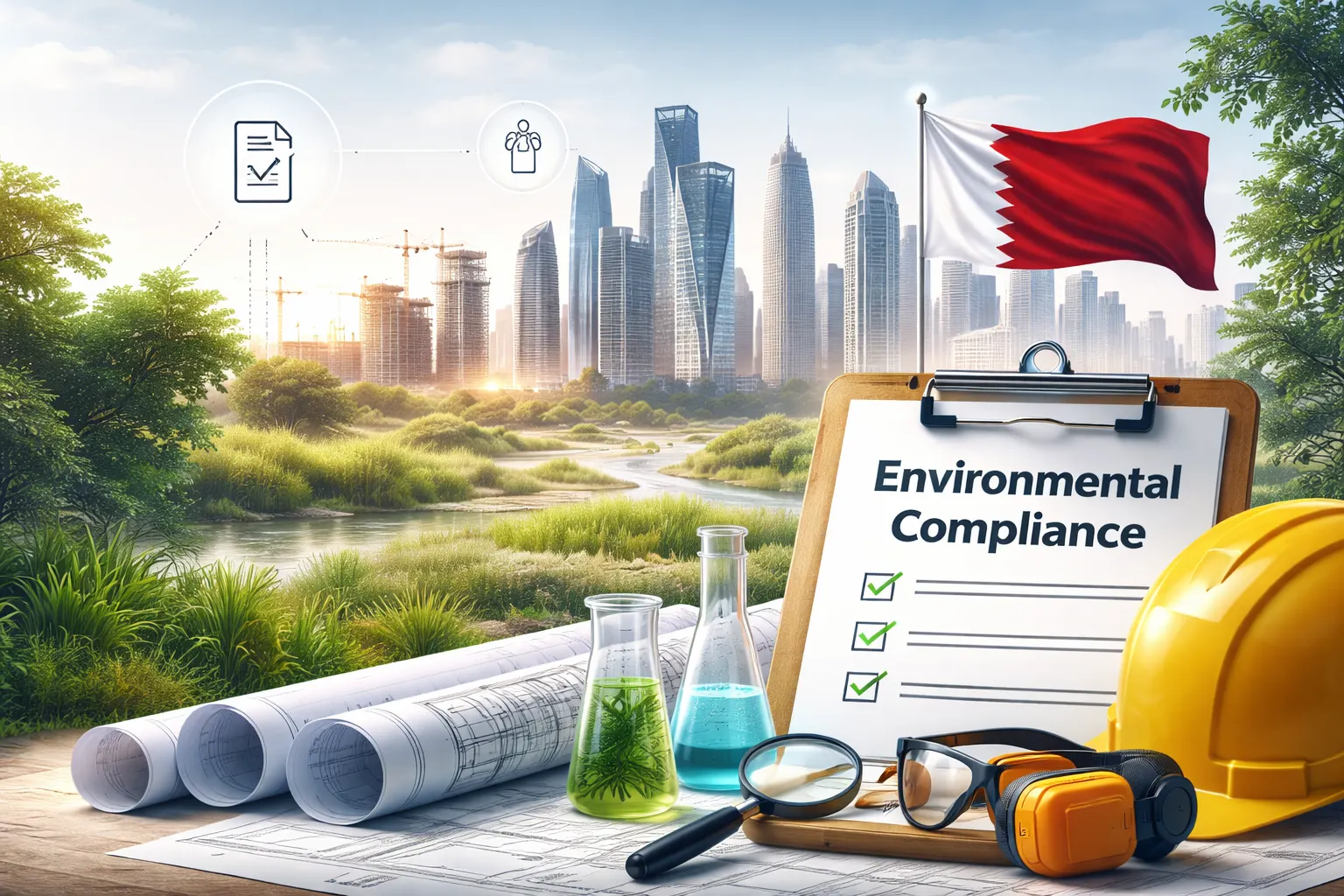MoECC Tightens Oversight: Why Environmental Permits and EIA Compliance Are Non-Negotiable for Qatar Projects in 2025

Introduction
In August 2025, the Ministry of Environment and Climate Change (MoECC) issued a strong reminder: all project owners in Qatar must comply with environmental assessment requirements and secure the proper environmental permits before starting any operation.
This announcement reflects a shift toward stricter oversight in Qatar’s development sector. For developers, contractors, and environmental consultants, this means that EIA (Environmental Impact Assessments), compliance monitoring, and Construction Environmental Management Plans (CEMP) are no longer procedural checklists—they are legal obligations and operational necessities.
In this article, we explore what this renewed focus means for the industry, the risks of non-compliance, and how CEMPs help projects stay within the law while protecting Qatar’s environment.
The MoECC Announcement: What Changed in 2025?
The August 2025 statement stressed three critical points:
- No project can proceed without environmental permits.
- EIAs must assess both positive and negative impacts of proposed developments.
- Ongoing monitoring and reporting are required, even after projects move into operation.
According to Eng. Ahmed Abdulkarim Al Ibrahim, head of MoECC’s Environmental Assessment & Permit Department, project owners must ensure that assessments are completed and mitigation measures are in place. Failure to comply could result in violations, fines, or project suspensions (Qatar Tribune).
This stance aligns with Qatar’s National Vision 2030, which prioritizes environmental sustainability alongside economic development.
Why Environmental Consultancy in Qatar Is More Crucial Than Ever
Complex Regulations Require Expert Guidance
With stricter rules and evolving frameworks, navigating environmental permitting is increasingly complex. Environmental consultants help organizations:
- Prepare high-quality EIA reports.
- Develop effective CEMPs.
- Ensure full regulatory compliance.
Aligning with International Standards
Qatar’s MoECC integrates global frameworks such as ISO 14001:2015 into its compliance models. Consultants ensure projects meet both local laws and international benchmarks—helpful for companies working with global investors and stakeholders.
The Risks of Starting Projects Without Permits
Some developers may be tempted to fast-track projects without waiting for permits. However, the risks are significant:
- Legal Consequences: MoECC has authority to issue fines, revoke permits, or halt projects entirely.
- Financial Losses: Non-compliance can delay projects for months, increasing costs.
- Reputational Damage: Violations harm investor trust and corporate image.
- Environmental Harm: Beyond penalties, uncontrolled projects risk damaging Qatar’s fragile desert and marine ecosystems.
In Q1 2025 alone, the MoECC conducted 1,090 inspections and identified 8 environmental violations, enforcing 22 corrective actions (QNA report).
The Growing Role of Public Consultations
Another key point from MoECC’s announcement was the role of public participation. In fact, in early 2025 the Ministry facilitated 941 public consultation meetings for projects under review (QNA).
Why does this matter?
- Transparency: Communities can voice environmental concerns before approvals are granted.
- Better Outcomes: Early feedback leads to stronger mitigation measures.
- Legal Protection: Projects with community buy-in face fewer disputes later.
Read our detailed guide on Understanding EIA in Qatar.
CEMP: Turning Compliance Into Action
A Construction Environmental Management Plan (CEMP) transforms the commitments in an EIA into daily on-site practices. In Qatar, MoECC often requires CEMPs as part of permit conditions.
Key Components of a CEMP
- Dust and Noise Control: Measures to reduce pollution during construction.
- Waste Management: Safe storage, segregation, and disposal of materials.
- Monitoring Programs: Regular air, water, and soil testing to ensure compliance.
- Emergency Response Plans: Procedures for spills, accidents, or natural hazards.
- Roles and Responsibilities: Clear duties for environmental officers and contractors.
- Training and Awareness: Toolbox talks and training sessions for workers.
Learn more about CEMP in Qatar.
Case Examples: Lusail Tower and Old Doha Port
At the ICE MENA conference in August 2025, experts highlighted Qatar projects such as Lusail Tower and Old Doha Port. These developments successfully integrated:
- EIA approvals from MoECC.
- CEMP frameworks for construction.
- ISO 14001 systems for operational compliance.
Frequently Asked Questions (FAQs)
Who issues environmental permits in Qatar?
The MoECC is the sole authority responsible for reviewing EIAs, issuing permits, and enforcing compliance.
Do small projects need an EIA?
Not always. MoECC decides through a screening process. Smaller projects may still require basic environmental clearance.
What happens if a project starts without a permit?
MoECC can impose fines, halt operations, or revoke approvals. Developers may also face reputational damage.
What is the role of consultants in CEMPs?
Consultants prepare and monitor CEMPs, ensuring construction activities follow MoECC conditions.
How do public consultations affect EIA approvals?
They ensure transparency and community input, often leading to stronger mitigation strategies and smoother approvals.
Conclusion
Qatar’s MoECC has made it clear: EIA, environmental permits, compliance, and CEMPs are non-negotiable in 2025. For developers, contractors, and consultants, this means stricter oversight but also greater opportunities to align with international sustainability standards.
By embracing these requirements proactively, project owners not only avoid legal risks but also contribute to Qatar’s environmental vision.